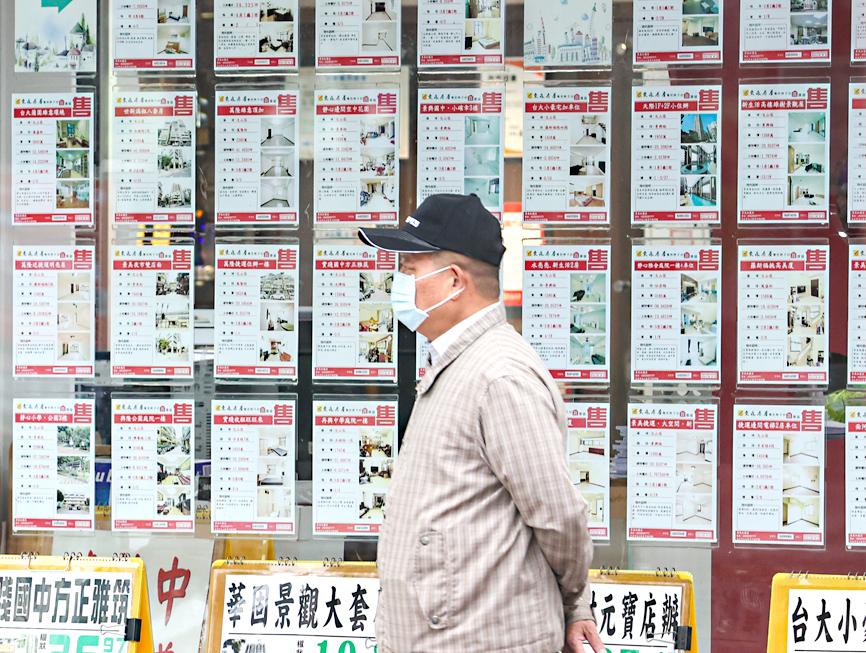Housing transactions in the nation’s six special municipalities last month soared 61.4 percent from a month earlier to 25,257 units, as the market emerged from a holiday effect, but interest rate hikes are driving market uncertainty, real-estate brokers said last week.
The figure marked an 11.9 percent increase over the same period last year, they said.
Kaohsiung, New Taipei City, Taichung, Tainan, Taipei and Taoyuan all reported transaction increases of more than 50 percent month-on-month, thanks partly to a low comparison base in February, as people put off purchases during the Lunar New Year holiday, brokers said.

Photo: CNA
“The week-long holiday postponed home purchases rather than wiping out buying interest altogether,” said Chen Chin-ping (陳金萍), deputy research head at Evertrust Rehouse Co (永慶房屋), Taiwan’s largest broker by the number of offices.
Tainan posted the fastest gain of 69.7 percent to 2,426 units, followed by Taipei’s 67.1 percent advance to 3,200 units, Kaohsiung’s 65.9 percent increase to 4,042 units, New Taipei City’s 60.7 percent pickup to 6,406 units, Taichung’s 59 percent increase to 4,953 units and Taoyuan’s 53.1 percent growth to 4,230 units, data from local governments showed.
Transactions in central and southern Taiwan have outpaced deals in Taipei and are catching up with New Taipei City, indicating that demand for property spread nationwide, and the economic gaps between the north and the south narrowed.
For the first quarter of the year, housing deals grew 4.4 percent year-on-year to an 11-year high of 64,921 units, government data showed, as the market thrived despite unfavorable policy measures.
Tainan posted the fastest increase of 10.2 percent annually, followed by New Taipei City’s 8.9 percent advance and Kaohsiung’s 7.2 percent increase, the data showed.
Announcements that high-tech firms were building new plants in Tainan and Kaohsiung have boosted property prices there by more than 30 percent in the past few years, brokers said, adding that improving infrastructure and relative housing affordability also supported the increase in sales.
However, the market could face pressure after the central bank and the US last month raised interest rates by 25 basis points, which they could increase further to try to curb inflation, said Tseng Ching-der (曾進德), research manager at Sinyi Realty Inc (信義房屋), Taiwan’s only listed broker.
The hawkish moves would increase mortgage burdens and discourage investment-driven home buyers, but could have a limited effect on people with real demand, Tseng said.
H&B Realty Co (住商不動產) said the market would need more time to assimilate rate increases, Russia’s invasion of Ukraine and a surge in local COVID-19 infections.
The data suggest a healthy market, but people should avoid overleveraging in volatile times, H&B research head Jessica Hsu (徐佳馨) said.

With an approval rating of just two percent, Peruvian President Dina Boluarte might be the world’s most unpopular leader, according to pollsters. Protests greeted her rise to power 29 months ago, and have marked her entire term — joined by assorted scandals, investigations, controversies and a surge in gang violence. The 63-year-old is the target of a dozen probes, including for her alleged failure to declare gifts of luxury jewels and watches, a scandal inevitably dubbed “Rolexgate.” She is also under the microscope for a two-week undeclared absence for nose surgery — which she insists was medical, not cosmetic — and is

CAUTIOUS RECOVERY: While the manufacturing sector returned to growth amid the US-China trade truce, firms remain wary as uncertainty clouds the outlook, the CIER said The local manufacturing sector returned to expansion last month, as the official purchasing managers’ index (PMI) rose 2.1 points to 51.0, driven by a temporary easing in US-China trade tensions, the Chung-Hua Institution for Economic Research (CIER, 中華經濟研究院) said yesterday. The PMI gauges the health of the manufacturing industry, with readings above 50 indicating expansion and those below 50 signaling contraction. “Firms are not as pessimistic as they were in April, but they remain far from optimistic,” CIER president Lien Hsien-ming (連賢明) said at a news conference. The full impact of US tariff decisions is unlikely to become clear until later this month

GROWING CONCERN: Some senior Trump administration officials opposed the UAE expansion over fears that another TSMC project could jeopardize its US investment Taiwan Semiconductor Manufacturing Co (TSMC, 台積電) is evaluating building an advanced production facility in the United Arab Emirates (UAE) and has discussed the possibility with officials in US President Donald Trump’s administration, people familiar with the matter said, in a potentially major bet on the Middle East that would only come to fruition with Washington’s approval. The company has had multiple meetings in the past few months with US Special Envoy to the Middle East Steve Witkoff and officials from MGX, an influential investment vehicle overseen by the UAE president’s brother, the people said. The conversations are a continuation of talks that

CHIP DUTIES: TSMC said it voiced its concerns to Washington about tariffs, telling the US commerce department that it wants ‘fair treatment’ to protect its competitiveness Taiwan Semiconductor Manufacturing Co (TSMC, 台積電) yesterday reiterated robust business prospects for this year as strong artificial intelligence (AI) chip demand from Nvidia Corp and other customers would absorb the impacts of US tariffs. “The impact of tariffs would be indirect, as the custom tax is the importers’ responsibility, not the exporters,” TSMC chairman and chief executive officer C.C. Wei (魏哲家) said at the chipmaker’s annual shareholders’ meeting in Hsinchu City. TSMC’s business could be affected if people become reluctant to buy electronics due to inflated prices, Wei said. In addition, the chipmaker has voiced its concern to the US Department of Commerce